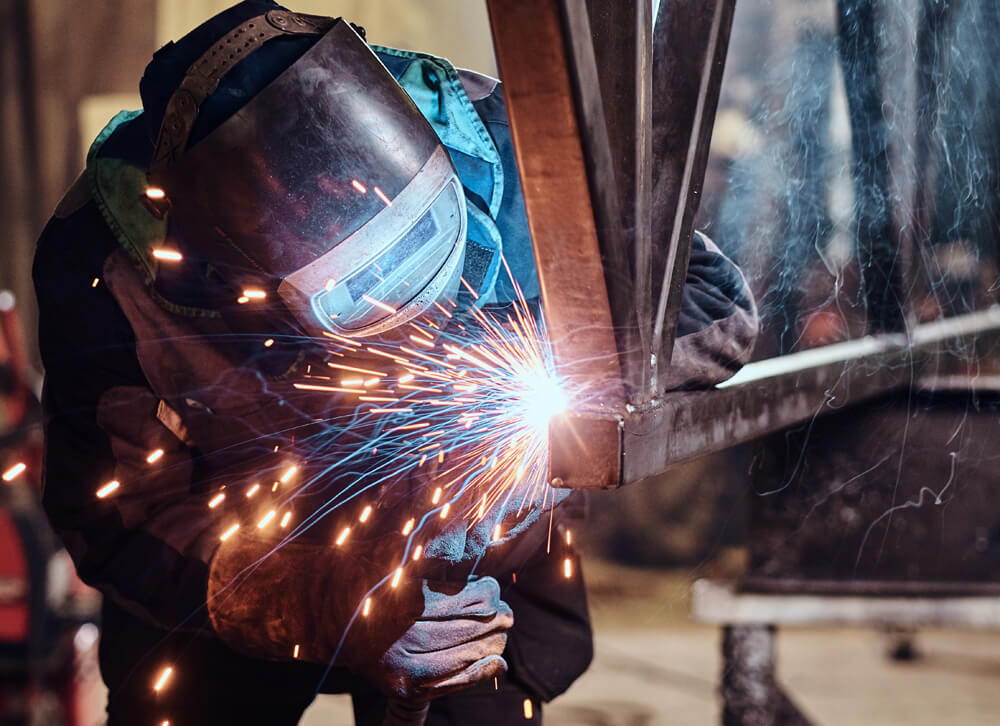Overview
Click on the tabs to learn more. Hint! Some tabs may be hidden. Click on the right green arrow to scroll.
Why Welding?
The Welding Technology program at MCC provides you with the opportunity to learn a variety of technical skills and expands your knowledge of industry norms. Training is informed by theory and built on an academic foundation that includes mathematics and communication.
INDUSTRY DATA
As of 2024 the United States is experiencing a national shortage of welding professionals. Many online sources cite a steady regional demand for welders in Maine, Massachusetts, New Hampshire and Vermont due to an aging workforce, a lack of new welders entering the profession and an increased need for welding services.
In “Welding Market Outlook 2024-2030” LinkedIn.com states that the Global Welding Market is anticipated to rise at a “considerable rate” over the next six years. During that same period Careercloud.com is projecting industry growth of 8%. In New Hampshire between 2024-2026, the NH Employment Security Economic and Labor Market Information Bureau predicts the demand for welders, cutters, solderers, brazers, machine setters, operators and tenders to remain in-demand.
Program Options
The Welding program at MCC offers a Welding Technology Applied Science Degree (A.A.S) and two options for certificate training.
A.A.S. DEGREE OPTION
- Welding Technology Associate of Applied Science Degree (A.A.S.)
CERTIFICATE OPTIONS
The two certificates available through MCC’s Welding Technology program can be earned as standalone credentials and/or earned credits can be applied as building blocks toward the Welding Technology A.A.S. degree.
- Welding Technology Certificate
Earning a Welding Technology Certificate gives you the necessary welding skills required for employment as a non-code combination welder or welder’s helper. This certificate is the first step in earning credits toward a Welding Technology A.A.S. degree. - Welding Technology Professional Certificate
Earning a Welding Technology Professional Certificate gives you the necessary welding skills required for employment as a non-code combination welder plus courses in manufacturing repair and CAD. This certificate fulfills all the credits needed for first-year degree training and can be applied toward the MCC Welding Technology A.A.S. degree.
OTHER TRAINING
In addition to the for-credit program options listed above, Accelerated Welding training is also offered through the MCC Workforce Development Center.
More About the Program
For more about this program, including the curriculum, click tabs above.
Curriculum
Admission Requirements
In addition to college-wide requirements, students must place into MATH111M or MATH111XM, Numerical Geometry or Numerical Geometry – Corequisite and ENGL110XM or ENGL110M, College Composition I with Corequisite or College Composition I.
Technical Standards
- Normal vision for reading instructions and for performing tasks (adaptive equipment acceptable).
- Manual dexterity with both hands; good hand and eye coordination.
- Ability to visualize and portray ideas graphically.
- The physical strength to maneuver and/or lift heavy objects.
- Ability to stand for long periods of time while welding and or torch cutting.
- Pacemaker wearers — High frequency welding may cause Interference with Pacemaker operation.
- Welding and Torch cutting is a high heat process that may at times cause students to be uncomfortable.
Course Sequencing
Degree Program – First Year
ENGL110XM or ENGL110M
Total Credits: 4
Degree Program – Second Year
Social Science Elective (3 credits)
Total Credits: 3
(ANTH, ECON, GEOG, HIST, POLS, PSYC, SOCI)
Science Elective (3 credits)
Total Credits: 3
(BIOL, CHEM, ENVS, ESCI, GEOL, PHYS)
Foreign Language/Humanities/Fine Arts Elective
Total Credits: 3
Program Outcomes
Skill Development
Graduates of MCC’s Welding Technology program will gain marketable skills in a variety of welding processes required for entry into the workforce. Welding program graduates are also prepared for welder qualification testing used throughout the industry.
Students who graduate from this program will be able to:
- Possess basic competency in the four major welding processes
- Demonstrate basic concepts and practices of technical drawing and blueprint reading in accordance with industry standards
- Articulate safety guidelines and use of machine tools
- Produce drawings using Computer Aided Drafting (CAD) software
- Refine skills to meet code requirements for heavy plate & pipe welding
- Demonstrate knowledge of materials structures; heat treatment processes; the composition of ferrous and non-ferrous alloys; and the effects of heat-treatments on metals
- Articulate industrial quality control procedures
- Demonstrate fabrication techniques and cost estimation, and principles of applied statics and strength of materials
Potential Jobs
- Cutter
- Machine Operators
- Machine Setter
- Machine Tenders
- Solderer and Brazer
- Welder
Potential Salary
There is a wide range of jobs in the welding industry. See below for the average annual salary range in NH for a Welder.
| ENTRY LEVEL | MID-RANGE | EXPERIENCED |
| $38,106 | $49,442 | $56,410 |
*New Hampshire Occupational Employment & Wages 2021, published by the NH Economic + Labor Market Information Bureau — Salaries are based on 40 hours of work, not including overtime.
Transfer Opportunities
- UNH College of Professional Studies
- Ferris State University
- Southern NH University
- …and many more!
Welding Technology Certificate (Evenings Only)
Successful completion of this program gives you the necessary welding skills required for employment as a combination welder, including SMAW pipe. AWS 3/8” Plate Bend test skills are required to enter the Weld III Advanced Pipe/Plate course.
Academics
of MCC classes have 19 or fewer students.


